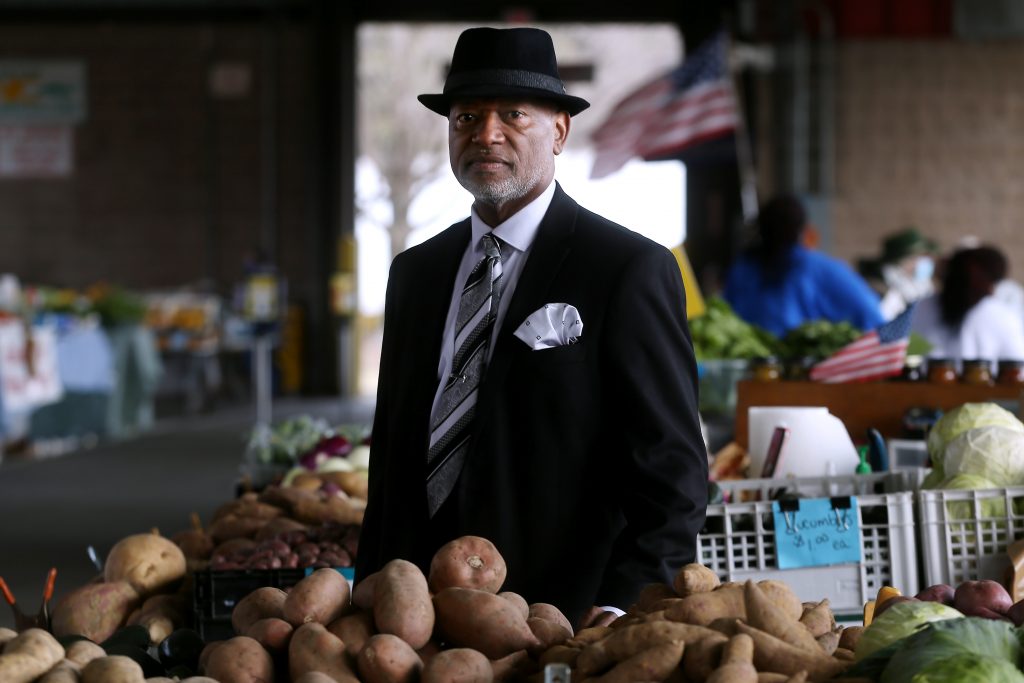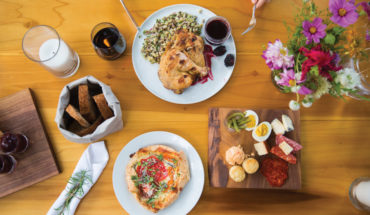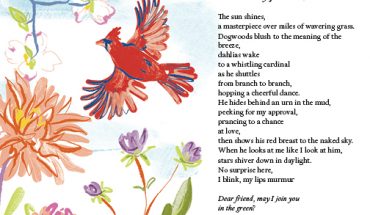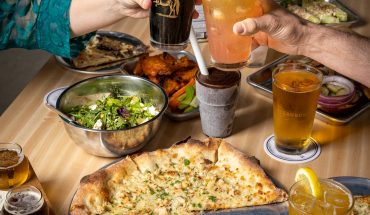From seed to stovetop, family and food are intertwined.
by Lenard D. Moore / photography by Bob Karp

When I was growing up, eating good food was a family tradition, especially the delicious choices for all at any gathering. Mostly there were vegetables steaming and waiting for us, but there were some raw ones too, freshly picked, sliced, and neatly arranged on plates — onions, cucumbers, and tomatoes. All of them were from our backyard garden.
This celebration of food began with the seeds that my father and I purchased from the farm supplies store. I also received seeds from my great-grand- mother and great-aunt, who knew that I gardened each year and that I knew how to take care of a garden because I learned from them, as well as my father. I remember the joy of turning the soil with a shovel, making furrows with the garden hoe, planting, hilling, and watering the seeds or plants that needed hand-setting, such as collards, cabbage, and tomato slips. I learned how to transplant corn from my great-grandmother, including what to do with the long leaves.
I tended the garden — weeding, hilling, watering, and raking — until the waist-high and shoulder-high plants yielded their output. Always on the ground, cucumber, watermelon, and cantaloupe vines sprawled all over the plot. Pole beans wrapped around the slender poles. Of course, I worried about deer and rabbits nibbling whatever they wanted in the garden, but I also learned how to build a scarecrow from my great-grandmother and great-aunt. I recall how scarecrows guarded my great-grandmother’s corn and peanut fields while my brothers and I chopped grass away from the long rows in the stifling sun. We worked, talked, joked, and laughed, but we paid attention to our chopping, keeping our eyes focused.
Like others in our African American community, we often ate from our garden. There was no talk of going to the grocery store for vegetables. After harvesting what we wanted from the garden, we sat on the front porch where we snapped or shelled beans and shucked corn with our father. All we knew was eating fresh food out of the garden.
In my early years, another one of our great-aunts took my brothers and me fishing, and she taught us how to fish — the baiting, casting, and reeling in the catch — for one big enough to take off the hook and place in the bucket. She would pick us up and drive us to the fishing spots, mostly the Atlantic Ocean where the breaking blue-gray water seemed to whisper to us. It was beautiful. It was calming. It was happiness.
In those same years, my great-grand- mother, my grandmother, and my uncle raised chickens. Another one of my uncles raised pigs. Thus, there was fresh meat, too. So the community was packed with food, despite the eye-burning sweat from all of the work that it took to put food on our table.
Later years, far into adulthood, my youngest sister would ask, “Do you remember when Dad-Dad would have sweat dripping off him while cooking for us?”
“Yes,” I said, picturing the cooking scene vividly as if it were not in the distant past. That’s how it was. It seemed like he enjoyed cooking in that hot kitchen. In fact, I knew that he knew what fatherhood was all about, and he demonstrated how to be a good provider and a great father. At breakfast, his favorite dish often steamed in front of us. I can still smell those fried potatoes and onions. They were delicious.
Perhaps I should have said that I learned how to clean fish from my grandfather. I scaled, gutted, and cleaned the flounder, trout, spot, or croaker. I can still picture the silver pan piled with fish in it, smelling of the sea, on the long, wooden table in the backyard. Then, in early evening, our mother fried the fish and made hot-water cornbread. At any moment, we might push through the black swinging doors into the kitchen so that we could smell the aroma of supper.
Supper, which is what we called the evening meal, consisted of fresh cooked collards, baked macaroni and cheese, hot fish, and cornbread. There was freshly picked hot pepper, which was diced for the collards, and hot sauce for the fish. Sometimes our mother baked a pineapple upside-down cake. We were well fed. So it was typical to leave the table happy and content.
I am reeling with food memories. My sisters recently told some people how, in my late teens, I cooked for them, our whole family in fact. Yes, I learned to cook from our parents.
I experimented with cooking different meals, too. I even had a recipe, A La Beef Delight, published in a cookbook. I remember how my late daughter loved a particular dish that I cooked — barbecue chicken with steamed rice baked in it. I always made certain that there was enough sauce to drizzle over the rice. Like my father, I sliced fresh tomatoes, cucumbers, and onion, too. It was not difficult to keep the custom going because my daughter enjoyed healthy meals. She also enjoyed whenever I grilled food in the backyard.
It still gives me pleasure to remember our eating together as a family. When my father arrived home from working at Camp Lejeune, we knew it was suppertime. Our mouths began to water. No one trickled to the table late.
Although my childhood home in Jacksonville was bulldozed earlier this decade to make room for the expansion of the highway, I still carry such fond memories of family and food. It’s bittersweet now because my great-grandmother, grandmother, great-aunts, my uncle, and my daughter have transitioned. Sadly, that roster of loss of kinfolk has grown. But food and the memory of food are still cherished in Eastern North Carolina.
Lenard D. Moore is executive chairman of the North Carolina Haiku Society and founder and executive director of the Carolina African American Writers’ Collective. This story was published in All the Songs We Sing: Celebrating the 25th Anniversary of the Carolina African American Writers’ Collective. He lives in Raleigh.
This article originally appeared in the March 2021 issue of WALTER magazine.



